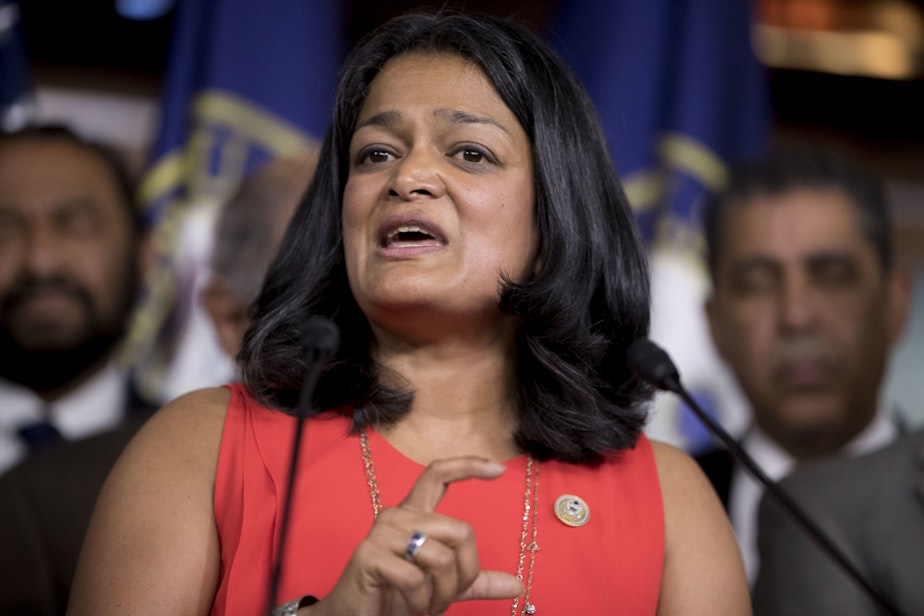Jayapal trumpets infrastructure bill passage, predicts success for Build Back Better

Late last Friday, Congress passed a long-awaited infrastructure package to the tune of $1.2 trillion. Washington State will receive more than $8.5 billion in dedicated funds for things like roads and bridges, and also mass transit and broadband access. But, there won't be any money for paid family leave or fighting climate change. That separate, massive social spending package that President Biden campaigned for is still being worked on.
Washington Congresswoman Pramila Jayapal talked to KUOW’s Kim Malcolm about the impact of the infrastructure bill, and what's coming next.
This interview has been edited for clarity.
Kim Malcolm: Let's take a look at what did pass, the infrastructure bill. What is in it for your constituents and for Washington State?
Congresswoman Jayapal: $8.5 billion will come to Washington state. This is the largest federal investment in public transit in American history. And it's also the largest dedicated bridge investment since the creation of the Interstate Highway in the mid-1900s. Also, it will provide $17 billion in port infrastructure and carbon emissions reduction initiatives like port electrification. There's also money for high-speed internet access. It is a significant package, and we're excited to be getting so much of it here into Washington State.
Congresswoman, sometimes these infrastructure projects feel like they can go on forever. How long do you think it's going to be until folks here in Washington actually get to feel the impact of them in their lives?
I think we're going to see the impact quite quickly. As soon as this is signed, I know Secretary Buttigieg is working very hard to get the money distributed out of the Department of Transportation. You will see, for example, the state being able to move forward on major bridge projects. The West Seattle Bridge is a part of that, the Magnolia Bridge.
Sponsored
We will immediately start to see more people having jobs. We will see the investment in Sound Transit. As you know, in order to move the Sound Transit plan forward quickly, we need to make sure we're getting the money into Sound Transit, and that will now happen.
I think our residents are going to see that government's got their back. That's really what both the infrastructure bill and the Build Back Better Act are about. Government is a great equalizer of opportunity, and we're going to do it right here in our state.
Let’s talk now about what has not been passed yet. I'm thinking of your vast social policy and climate change bill. Was that a defeat for you not to have both those bills voted on together last week?
We would have liked to have both bills, but what I think is really a victory is that we now have the commitment from the six Democrats who were waiting for some more information from the Congressional Budget Office. They have now committed to us that, pending the receipt of that information, but no matter what no later than November 15, that week, that we will pass that bill, and we will do it.
Four weeks ago, there was no Build Back Better Act that had been agreed to, that had been negotiated with the Senate, the House, and the White House. There was certainly no text for the bill, and there was no vote on the rule, which is essentially the procedural move that we have to make to move the bill forward. Now, we've had all of that in four weeks, just by the Congressional Progressive Caucus really holding firm and saying we're not going to leave anyone behind. And next week, I believe we're going to pass that through the house.
Sponsored
A lot has been made of the fact that things like lower drug prices, and paid family leave, and measures to fight climate change are wanted by a majority of Americans. Yet much of what we're seeing now is how congressional Democrats can't agree. You have said that a major lack of trust is driving the dynamics among members of Congress in these negotiations. How do you address that going forward?
I think that's why it was so important for us to come to agreement between the progressives and the six Democrats that were still not there on the bill. I do think it's important for us to start to rebuild trust, and to be able to negotiate directly with each other because I think that's the other thing that we realized. It works much better when we just talk directly to each other. That's part of what began to happen.
I'm looking forward to continuing to rebuild the trust because at the end of the day, not a single Republican will vote for universal childcare, universal Pre-K, lowering prescription drug prices, investing in housing, taking on climate change, supporting immigration. These are all the things in this transformative Build Back Better package, and just like the American Rescue Plan, this is going to be passed with only Democratic votes. We know that it's Democrats who are really on the side of the people, and that's what we have to continue to do, deliver for the people.
Listen to the interview by clicking the play button above.





